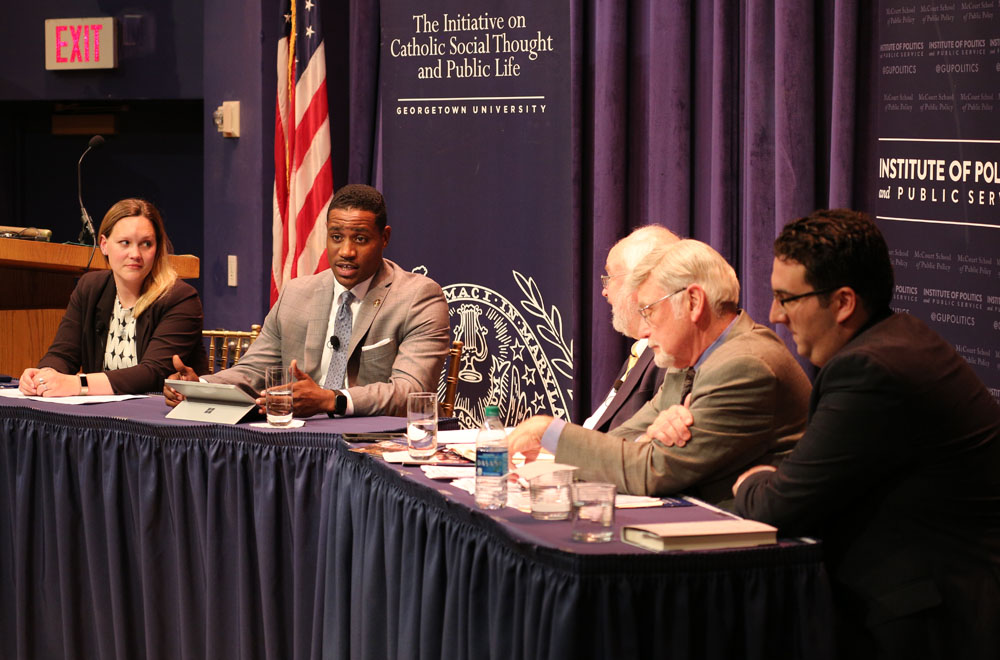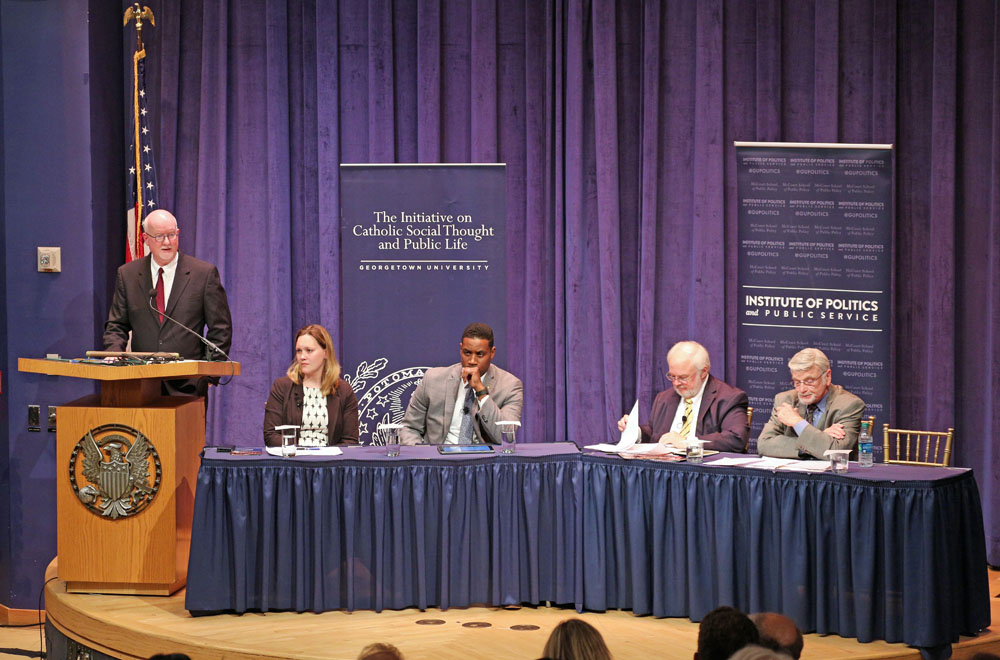
Justin Giboney, second from left, speaks June 18 during the final panel in the "Faith and the Faithful in U.S. Politics" dialogue series at Georgetown University. From left: Elizabeth Podrebarac Sciupac, Giboney, John Carr, Cecil Roberts and Michael Wear. (Courtesy of Georgetown University/Shimeng Tong)
The final panel in the "Faith and the Faithful in U.S. Politics" series of dialogues at Georgetown University June 18 examined the issue of whether the Democratic Party has a religion problem. Last month, another panel debated the merits of the question from the Republican side.
As with everything in politics these days, the answer seems to be that it's complicated.
Shaun Casey, director of Georgetown's Berkley Center for Religion, Peace & World Affairs, framed the conversation from the start by noting that "No political party embodies the whole Gospel," and that Christians are called to read the signs of the times and make prudential decisions about how they cast their votes.
Casey, who was the director of the State Department's Office of Religion and Global Affairs under President Barack Obama, further cautioned that it is incumbent on communities of faith to resist the attempts by political parties of any stripe to lure them into a permanent alliance, as seems to be happening.
"The political independence of faith communities is good for both faith communities and democracies," he said.
One of the overarching themes of the evening's conversation was that party leaders and rank-and-file Democrats have very different agendas when it comes to religion. That is borne out in surveys by the Pew Research Center, which have shown that while the percentage of Democrats identifying as religiously unaffiliated is about 30 percent, the rest do identify with their faith and with guiding religious principles.
"The majority of registered Democratic voters are religious," said Elizabeth Podrebarac Sciupac, a research associate at Pew.
Among Catholics, Latinos are a growing force in the Democratic Party, while white Catholics are drifting toward the Republican Party, she said. "The Democratic Party is becoming somewhat less white, and a lot of the religion problem is among white voters."
About six in 10 of those polled by Pew say it is necessary to believe in God to be moral, she said, and for most religious voters, abortion — and culture war issues generally — is not the issue of greatest importance. The economy, foreign policy, and terrorism are more at the top of their minds.
Part of the disconnect, though, is that party leaders have taken that to mean that religion as an issue is off the table, she said. That has led to, for instance, a party line that defense of abortion is a nonnegotiable for those running for public office who hope to gain party support.

The final panel in the "Faith and the Faithful in U.S. Politics" series of dialogues takes place June 18 at Georgetown University. From left: Shaun Casey, Elizabeth Podrebarac Sciupac, Justin Giboney, John Carr and Cecil Roberts (Courtesy of Georgetown University/Shimeng Tong)
John Carr, the director of Georgetown's Initiative on Catholic Social Thought and Public Life, which has hosted the series of panels, asked whether a Pope Francis Catholic could run for office in the Democratic Party today and be elected, or run for a judicial seat and win.
"I doubt it," he said. For Catholics in the Democratic Party, "there's a level of polarization if you don't toe the line. You get undermined really fast and get called a lot of names."
Justin Giboney, an Atlanta-based political strategist and co-founder and president of the AND Campaign, a coalition of urban Christian groups, questioned why social justice and Biblical values must be seen as mutually exclusive.
"The donor class, the consultant class, is very much out of tune with the rest of the party," he said, noting that progressivism should not be defined merely as secular and permissive, which is how those controlling the party too often interpret it, to the exclusion of many party faithful who are religiously faithful.
"The party can't be one that excludes people of faith," Giboney said.
As long as it does that, said Michael Wear, who directed faith outreach for Obama's 2012 reelection campaign and served in the White House Office of Faith-Based and Neighborhood Partnerships, it will continue to lose elections to Republicans who are better at cultivating support among religious voters.
"The Democrats can't just say how bad Trump is. They have to show they care about the faith community," he said, noting that 81 percent of white evangelicals voted for Trump while only 16 percent voted for Hillary Clinton, who made no effort to court those voters.
"That's less than John Kerry and 5 points less than Obama in 2012, after endorsing gay marriage, and he still got 5 more points," said Wear. "You have to be engaging in serious political malpractice to get only 16 percent. She didn't care, and at the same time, Trump was saying 'I'm the only one who cares about you.' It is a major problem for the Democratic Party."
Cecil Roberts, president of the United Mine Workers of America and a vice president of the AFL-CIO, hails from Appalachia, where Christian coal workers traditionally provided a bastion of support for the Democratic Party. He pointedly noted that there is an implied discrimination against people because of where they're from, because of their accents, or because they embrace God and guns, as Obama disastrously noted during the 2008 campaign.
"Some democrats with good intentions make comments and take positions that are extremely painful to people where I'm from," he said.
Advertisement
Roberts was a supporter of U.S. Rep. Conor Lamb (D-Pennsylvania), who was elected earlier this year to the House in a special election. He won major party support despite being Catholic, a gun owner, and opposed to abortion. His election seemed to prove the exception to the rule.
"There are two things we've given up as Democrats: patriotism has been taken over by the Republican Party, and God has been taken over by the Republican Party," said Roberts, with the cadence of a preacher. "I don't think we should give them either because they haven't earned it. If you give somebody both religion and patriotism, I don't know who's going to win, but I can tell you who's going to lose."
[Julie Bourbon is an NCR contributor based in Washington, D.C.]








